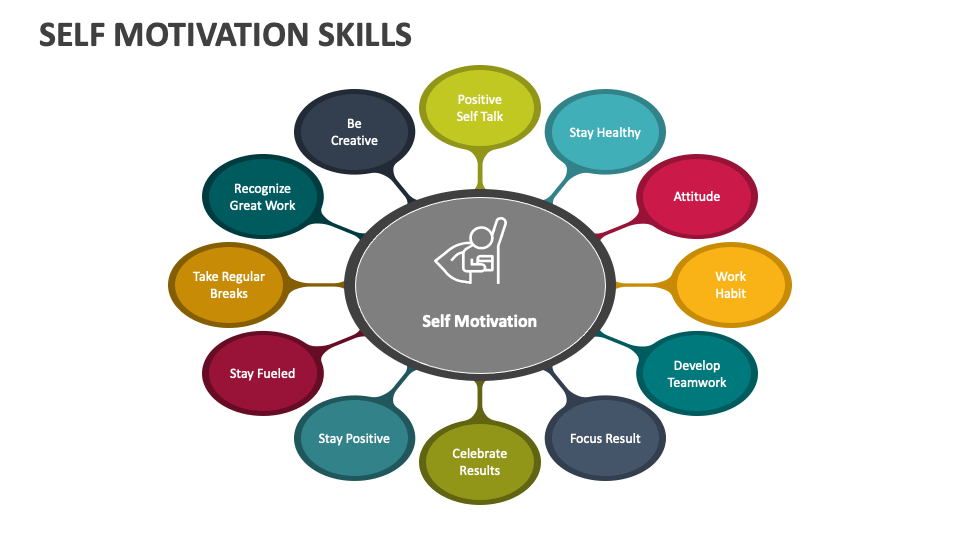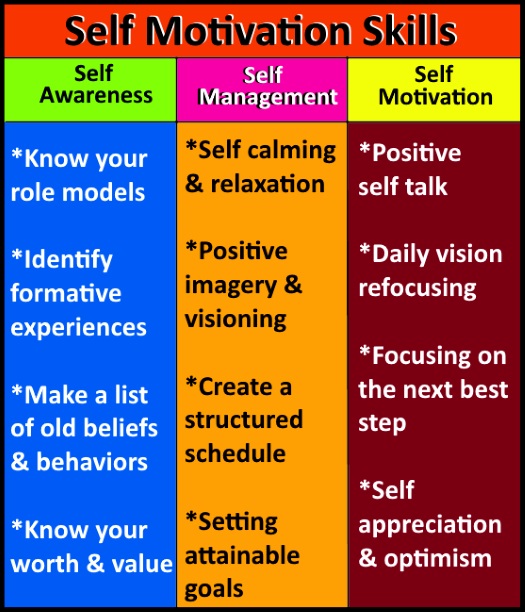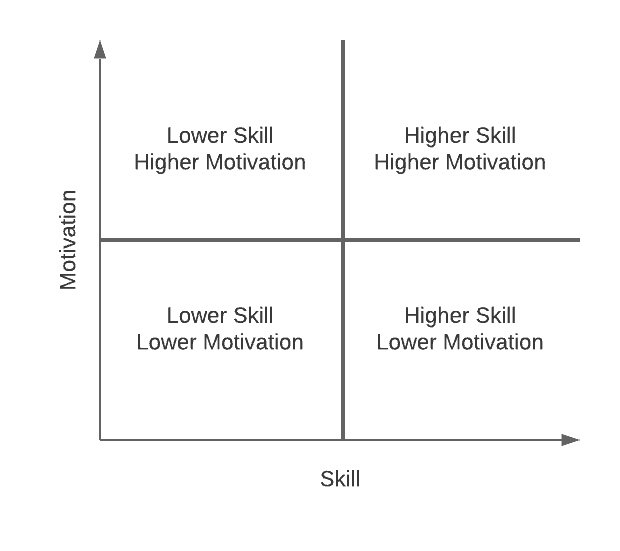Motivation skills refer to the ability to inspire and energize oneself or others towards desired goals. When individuals possess strong motivation skills, they can set objectives, maintain focus, overcome obstacles, and achieve success.
These skills are essential in various aspects of life, including personal growth, education, career development, and leadership. Motivation skills empower individuals to stay determined, take initiative, and remain persistent in their pursuit of excellence. Whether it involves motivating oneself to wake up early and exercise or inspiring a team to meet deadlines, mastering motivation skills can greatly enhance productivity, satisfaction, and overall success.
Understanding Motivation Skills
Motivation skills are the ability to inspire and drive oneself or others towards achieving goals. These skills involve understanding underlying desires, setting clear objectives, and finding ways to stay focused and committed. Mastering motivation skills can lead to increased productivity and satisfaction in various aspects of life.
Defining Motivation Skills
In order to understand the concept of motivation skills, it is important to first define what motivation skills actually are. Motivation skills can be defined as the set of abilities and traits that enable individuals to drive themselves and others towards achieving their goals and ambitions. These skills encompass a wide range of behaviors, attitudes, and techniques that inspire and encourage individuals to take action and remain focused on their objectives.
Importance Of Motivation Skills
The importance of motivation skills cannot be overstated, as they play a crucial role in personal and professional development. Whether you are a team leader, an entrepreneur, or an employee, possessing effective motivation skills can make a significant difference in your outcomes and achievements. Here are some key reasons why motivation skills are so important:
- Enhanced Productivity: Strong motivation skills can boost productivity levels by increasing determination, focus, and drive among individuals. When motivation is present, individuals are more likely to set challenging goals, overcome obstacles, and persevere in the face of difficulties.
- Improved Leadership: Motivation skills are vital for leadership success. Leaders who possess the ability to motivate themselves and others are more likely to inspire trust, build cohesive teams, and effectively drive their organizations towards success.
- Greater Job Satisfaction: Motivation skills contribute to greater job satisfaction by fostering a positive work environment and promoting a sense of fulfillment. When individuals are motivated, they are more likely to enjoy their work, feel engaged, and experience a sense of accomplishment.
- Increased Success Rates: Individuals with strong motivation skills are more likely to achieve their goals and realize their full potential. Whether it’s pursuing personal aspirations or professional objectives, motivation acts as the driving force that propels individuals towards success.
- Positive Mindset: Motivation skills help individuals foster a positive mindset, enabling them to overcome self-doubt, stay resilient, and maintain a proactive attitude. A positive outlook is essential for personal growth, self-improvement, and overcoming challenges.
Overall, understanding and cultivating motivation skills is integral to personal and professional growth. By enhancing productivity, improving leadership abilities, increasing job satisfaction, boosting success rates, and fostering a positive mindset, motivation skills empower individuals to achieve their goals and reach new heights.
Types Of Motivation Skills
When it comes to understanding motivation, it is important to recognize that it can manifest in different ways. Different individuals may be motivated by different factors, whether internal or external. In this section, we will explore the three main types of motivation skills, which are:
Intrinsic Motivation
Intrinsic motivation refers to the inner drive and passion that comes from within an individual. It is based on personal interest, enjoyment, and a sense of satisfaction that one derives from engaging in a particular activity or task. People who are intrinsically motivated are often driven by factors such as personal growth, autonomy, mastery, and a genuine passion for what they are doing. They are self-motivated and find fulfillment in the process itself, rather than relying on external rewards or recognition.
Extrinsic Motivation
In contrast to intrinsic motivation, extrinsic motivation is driven by external factors such as rewards, punishments, and recognition from others. Individuals who are extrinsically motivated are motivated by tangible rewards or the desire to avoid negative consequences. This could include receiving a bonus, obtaining a promotion, or seeking approval from others. While extrinsic motivation can be effective in driving short-term results, it may not be as sustainable or fulfilling in the long run.
Self-motivation
Self-motivation, also known as internal motivation, refers to the ability to motivate oneself without relying on external factors or influences. It involves having a clear sense of purpose, setting goals, and having the discipline and determination to take action towards achieving those goals. Self-motivated individuals are able to stay focused, overcome challenges, and persevere even in the face of adversity. They rely on their own internal drive and do not depend on external rewards or recognition to stay motivated.
In summary, understanding the different types of motivation skills – intrinsic, extrinsic, and self-motivation – is essential for both personal and professional growth. While each type has its own unique characteristics and benefits, cultivating a balance between intrinsic and self-motivation can lead to a more sustainable and fulfilling approach to achieving goals and finding success.
Developing Motivation Skills
Developing motivation skills is essential for achieving personal and professional success. Motivation skills refer to the ability to ignite and sustain the drive to take action and achieve goals. Whether it’s in the workplace, at school, or in any aspect of life, having strong motivation skills can propel individuals to overcome challenges and accomplish their aspirations. In this article, we will explore three key aspects of developing motivation skills: recognizing personal motivators, setting clear goals, and creating a positive environment.
Recognizing Personal Motivators
Understanding what motivates you on a personal level is crucial in developing motivation skills. Personal motivators can vary greatly from one individual to another, as they are influenced by factors such as values, interests, and past experiences. By recognizing and tapping into these motivators, you can effectively fuel your drive to succeed.
Consider keeping a journal or reflection log to identify activities or situations that consistently make you feel energized and engaged. This can help you uncover patterns and understand what truly inspires you. By aligning your goals and tasks with your personal motivators, you can increase your commitment and enthusiasm to achieve them.
Setting Clear Goals
Setting clear and specific goals is another essential aspect of developing motivation skills. Without a clear vision of what you are striving for, it can be challenging to stay motivated and focused. When setting goals, make sure they are SMART goals – Specific, Measurable, Achievable, Relevant, and Time-bound.
Avoid setting vague goals like “I want to lose weight” or “I want to make more money.” Instead, be specific by stating “I want to lose 10 pounds in the next three months” or “I want to increase my monthly income by 20% by the end of the year.” Breaking down your goals into smaller, manageable tasks can also help maintain motivation and provide a sense of progress as you achieve each milestone.
Creating A Positive Environment
Creating a positive environment is essential for nurturing motivation skills. Surrounding yourself with positivity and support can significantly impact your drive and enthusiasm. Eliminate or minimize negative influences that can dampen motivation, such as toxic relationships or environments. Instead, seek out individuals who inspire and encourage you.
Additionally, organize your physical and digital spaces in a way that promotes productivity and motivation. Keep your workspace clean and clutter-free, decorate it with motivational quotes or images, and ensure that you have access to resources that help you stay motivated.
In conclusion, developing motivation skills is crucial for achieving success in various areas of life. By recognizing personal motivators, setting clear goals, and creating a positive environment, individuals can maximize their motivation and drive to accomplish their aspirations. Remember that developing motivation skills is an ongoing process, requiring self-reflection, adaptation, and perseverance.

Credit: www.collidu.com
Effective Communication
Effective communication is a crucial aspect of motivation skills. It involves the ability to convey information, ideas, and emotions clearly and efficiently.
Listening Skills
Listening skills are an integral part of effective communication. By actively listening to others, you show respect and create a sense of trust. This skill allows you to understand different perspectives and gain insights that can contribute to better decision-making.
In order to enhance your listening skills, consider the following strategies:
- Avoid interrupting others while they are speaking.
- Maintain eye contact to show your engagement.
- Ask clarifying questions to ensure understanding.
Empathy
Empathy plays a crucial role in effective communication. It involves understanding and sharing the feelings of others. By demonstrating empathy, you create a supportive and inclusive environment where individuals feel heard and valued. This can lead to increased motivation and productivity.
To cultivate empathy, you can:
- Put yourself in the other person’s shoes and imagine their perspective.
- Listen attentively and acknowledge their emotions.
- Validate their experiences and offer support when needed.
Providing Constructive Feedback
Providing constructive feedback is essential for fostering growth and learning in individuals. It involves offering feedback in a respectful and constructive manner, focusing on specific behaviors or actions rather than personal attacks.
When providing constructive feedback, consider the following tips:
- Be specific about the behavior or action that needs improvement.
- Highlight the impact of that behavior or action on the individual or team.
- Suggest alternatives or solutions to help them improve.
Motivating Others
Motivating others is a crucial skill for any leader or team member. It involves understanding individual needs, providing recognition and rewards, and offering support and encouragement. By effectively motivating others, you can foster a positive work environment, enhance productivity, and inspire individuals to reach their full potential. In this section, we will explore each aspect of motivating others in more detail.
Understanding Individual Needs
One key element of motivating others is understanding individual needs. Different people have various motivators and drivers that influence their performance and engagement. As a leader or team member, taking the time to understand these needs can go a long way in creating a motivating environment.
Here are some steps you can take to understand individual needs:
- Engage in regular one-on-one discussions or check-ins with team members.
- Listen actively and empathetically to their concerns.
- Ask questions to gain insights into their personal and professional goals.
- Observe their work patterns and preferences.
By understanding individual needs, you can tailor your approach to motivation and provide the necessary support and resources that will help your team members thrive.
Recognition And Rewards
Recognition and rewards are powerful motivators that can significantly contribute to an individual’s level of engagement and performance. When people feel valued and appreciated for their efforts, they are more likely to be motivated to continue exceeding expectations.
Consider the following strategies for effective recognition and rewards:
- Regularly acknowledge and express appreciation for a job well done.
- Provide specific and meaningful feedback that highlights individual achievements.
- Implement a rewards system that aligns with company values and individual goals.
- Offer opportunities for growth and development, such as training programs or mentorship.
Remember, recognition and rewards should be tailored to each individual’s preferences and aspirations, ensuring they feel valued and motivated to perform at their best.
Support And Encouragement
Support and encouragement play a vital role in motivating others. When individuals feel supported, they are more likely to take on challenges, embrace new opportunities, and persist in the face of adversity.
Here are some ways you can provide support and encouragement:
- Be approachable and create an open and supportive environment.
- Offer assistance and resources when needed.
- Provide constructive feedback and guidance for improvement.
- Recognize and celebrate progress and milestones along the way.
By offering support and encouragement, you can empower individuals to overcome obstacles, take risks, and achieve their goals, ultimately fostering a motivated and high-performing team.

Credit: www.goodfinding.com
Maintaining Motivation
Motivation is the driving force that propels us towards achieving our goals. It gives us the energy, enthusiasm, and determination to overcome obstacles, push our limits, and keep moving forward. However, staying motivated is not always easy. Life can throw curveballs, challenges can become overwhelming, and at times, we may find ourselves on the brink of losing sight of our goals. That’s why it’s crucial to develop strategies to maintain motivation.
Overcoming Obstacles
Life is full of obstacles that can test our motivation. Whether it’s a setback at work, a personal crisis, or simply the monotony of daily tasks, these challenges can dampen our spirits and make it difficult to stay motivated. But remember, every obstacle presents an opportunity for growth and self-improvement.
Take a proactive approach by identifying the specific obstacles that are hindering your progress. Is it a lack of knowledge or skills, fear of failure, or external factors beyond your control? Once you pinpoint the barriers, you can develop strategies to overcome them.
One effective technique to overcome obstacles is to break them down into smaller, manageable steps. This allows you to tackle each challenge one at a time, increasing your chances of success. Additionally, seek support from mentors, friends, or colleagues who can offer guidance, motivation, and a fresh perspective. Surrounding yourself with positive influences can help you maintain your motivation even when faced with adversity.
Adopting A Growth Mindset
A growth mindset is a powerful tool when it comes to maintaining motivation. It is the belief that our abilities and intelligence can be developed through dedication, effort, and learning from failure. Embracing a growth mindset allows us to see setbacks and challenges as opportunities for growth rather than as indicators of our limitations.
To adopt a growth mindset, start by reframing your thoughts and language. Replace self-limiting beliefs such as “I can’t do it” with empowering statements like “I can learn and improve.” Cultivate a curiosity for learning and embrace challenges as opportunities to develop new skills and knowledge. By embracing a growth mindset, you’ll not only maintain your motivation but also open doors to new possibilities and achievements.
Self-care And Wellness
Self-care plays a vital role in maintaining motivation. Taking care of your physical, emotional, and mental well-being enables you to operate at your best, both professionally and personally. When we neglect self-care, our motivation can suffer, making it challenging to stay focused and energized.
Make self-care a priority by incorporating activities that promote relaxation, stress reduction, and overall well-being into your daily routine. This can include exercise, meditation, spending time with loved ones, pursuing hobbies, and getting enough restful sleep.
Additionally, ensure you are fueling your body with nutritious food that provides sustained energy throughout the day. Hydrating properly and avoiding excessive caffeine or sugary foods can also contribute to maintaining a balanced and focused mindset.
Maintaining motivation is a continuous process that requires effort and commitment. By overcoming obstacles, adopting a growth mindset, and prioritizing self-care, you can cultivate a sustainable motivation that propels you towards achieving your goals. Remember, motivation is not only a state of mind but also a skill that can be honed and developed over time.

Credit: tenmilesquare.com
Frequently Asked Questions
What Are Motivation Skills And Why Are They Important?
Motivation skills refer to the ability to inspire and drive oneself or others towards achieving goals. They are important because they increase productivity and satisfaction in personal and professional life.
How Can I Improve My Motivation Skills?
To improve motivation skills, set clear goals, break them into smaller tasks, reward yourself for progress, surround yourself with positive people, and maintain a healthy work-life balance.
What Are Some Common Examples Of Motivation Skills?
Common examples of motivation skills include self-motivation, goal setting, time management, positive attitude, resilience, effective communication, and the ability to inspire and motivate others.
How Do Motivation Skills Impact Personal Growth?
Motivation skills play a crucial role in personal growth by enhancing self-confidence, increasing resilience in overcoming challenges, and enabling continuous learning and self-improvement.
Can Motivation Skills Be Learned And Developed?
Yes, absolutely. Motivation skills can be learned and developed through self-reflection, goal setting, seeking guidance, practicing positive habits, and engaging in activities that inspire and motivate you.
Conclusion
To sum up, motivation skills play a crucial role in our personal and professional lives. By understanding the importance of setting goals, staying focused, and embracing positivity, we can cultivate an environment that fosters productivity and success. Developing these skills enables us to overcome challenges, maintain a positive mindset, and drive ourselves towards achievement.
Whether it’s achieving career goals or sustaining a healthy lifestyle, motivation skills empower us to create fulfilling lives. Embrace these skills, and you’ll witness the transformative power they hold.